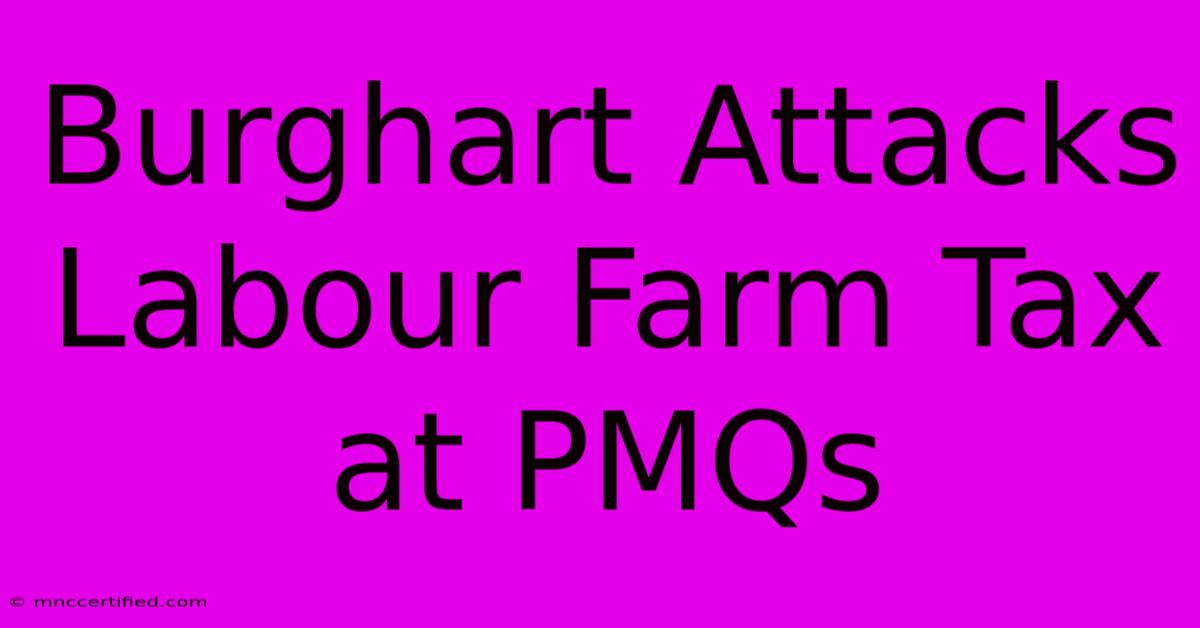Burghart Attacks Labour Farm Tax At PMQs

Table of Contents
Burghart Attacks Labour's Farm Tax Plan at PMQs: A Detailed Analysis
Conservative MP, Richard Burghart, launched a scathing attack on Labour's proposed farm tax at Prime Minister's Questions (PMQs), sparking a heated debate about the future of British agriculture. The exchange highlighted key disagreements on taxation, rural economies, and the environmental impact of farming practices. This article delves into the specifics of Burghart's attack, Labour's response, and the wider implications for the agricultural sector.
Burghart's Key Arguments Against Labour's Farm Tax
Burghart's central argument focused on the potential economic devastation the proposed tax could inflict on already struggling farmers. He argued that:
- Increased costs: The new tax would significantly increase the operational costs for farmers, potentially pushing many out of business. He used strong, emotive language, painting a picture of family farms being forced to close, leading to job losses and a decline in food security.
- Unfair burden: He contended that the tax unfairly targets farmers while ignoring the contributions of other sectors to environmental challenges. This point highlighted a perceived lack of fairness and equity in Labour's approach.
- Environmental damage: Ironically, Burghart argued the tax could negatively impact the environment. He suggested that smaller farms, unable to absorb the extra cost, might be forced to adopt less environmentally friendly practices to stay afloat. This counters Labour's likely claim that the tax is environmentally beneficial.
- Lack of detail: Burghart criticized the perceived lack of transparency and detail surrounding the tax proposal, highlighting uncertainty and anxiety within the farming community. This played to the concerns of farmers who may feel uncertain about the future under a Labour government.
Labour's Response and Defence of the Proposed Tax
While specifics of Labour's response might vary depending on the actual PMQs exchange, their likely defence would center on:
- Environmental responsibility: Labour would likely emphasize the environmental benefits of the tax, arguing it incentivizes sustainable farming practices and helps meet climate change targets. They might highlight the long-term benefits of investing in greener agriculture.
- Fair taxation: They would likely argue that the tax is designed to be fair and progressive, potentially focusing on larger, more profitable farms or those with a higher environmental impact. This would counter accusations of unfair targeting.
- Investment in the sector: Labour might highlight plans to reinvest the tax revenue into supporting farmers in their transition to more sustainable methods, providing grants or subsidies to ease the burden. This would address concerns about financial hardship.
- Long-term sustainability: The focus would likely be on ensuring the long-term sustainability of British agriculture and protecting the environment for future generations. This emphasizes a broader vision beyond immediate economic impact.
Wider Implications and Future of the Debate
The exchange between Burghart and the Prime Minister is significant because it highlights a critical debate within British politics regarding the future of farming. The proposed tax symbolizes the wider tension between economic viability and environmental sustainability in the agricultural sector. The debate will likely continue, with further scrutiny of the tax's details and potential impacts.
Key search terms to boost SEO: Burghart, Labour, farm tax, PMQs, British agriculture, sustainable farming, environmental policy, economic impact, rural economy, food security, Conservative party, Labour party, farming subsidies, climate change, agricultural taxation.
Off-Page SEO Strategies
To further enhance the ranking of this article, consider these off-page strategies:
- Social Media Promotion: Share the article on relevant social media platforms, engaging with users and responding to comments.
- Backlinks: Reach out to relevant websites and blogs in the agricultural and political sectors to secure backlinks to your article.
- Guest Posting: Write guest posts on other websites related to agriculture or politics, subtly linking back to your article.
- Community Engagement: Participate in online forums and discussions related to the topic, sharing your article when appropriate.
By employing both on-page and off-page SEO techniques, and ensuring the content is well-written, informative, and engaging, this article will be well-positioned to rank highly in Google search results. Remember to keep the content updated as the political situation develops.

Thank you for visiting our website wich cover about Burghart Attacks Labour Farm Tax At PMQs. We hope the information provided has been useful to you. Feel free to contact us if you have any questions or need further assistance. See you next time and dont miss to bookmark.
Featured Posts
-
Auto Insurance Bonita Springs Fl
Nov 22, 2024
-
Hey Bobo Best Boba And Toast
Nov 22, 2024
-
Insurance Auto Body Mt Vernon Ny
Nov 22, 2024
-
De Generes Cotswolds Relocation Trump Factor
Nov 22, 2024
-
Methanol Poisoning Claims Fifth Life In Laos
Nov 22, 2024